专四英语情态动词语法考点
情态动词的语法特征以及5大考点
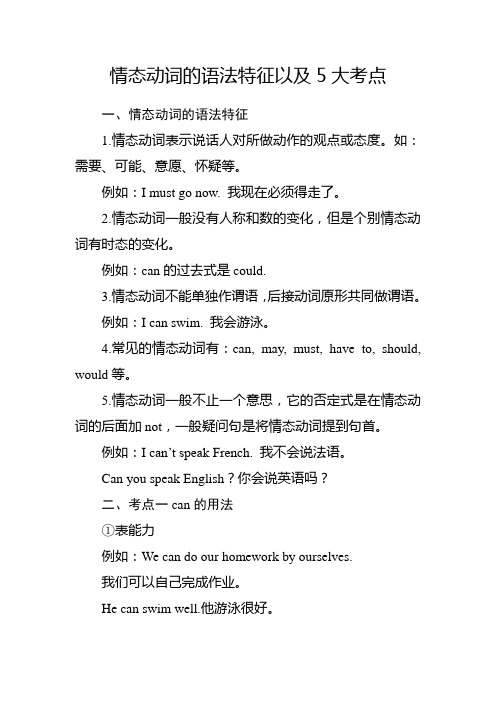
情态动词的语法特征以及5大考点一、情态动词的语法特征1.情态动词表示说话人对所做动作的观点或态度。
如:需要、可能、意愿、怀疑等。
例如:I must go now. 我现在必须得走了。
2.情态动词一般没有人称和数的变化,但是个别情态动词有时态的变化。
例如:can的过去式是could.3.情态动词不能单独作谓语,后接动词原形共同做谓语。
例如:I can swim. 我会游泳。
4.常见的情态动词有:can, may, must, have to, should, would等。
5.情态动词一般不止一个意思,它的否定式是在情态动词的后面加not,一般疑问句是将情态动词提到句首。
例如:I can’t speak French. 我不会说法语。
Can you speak English?你会说英语吗?二、考点一can的用法①表能力例如:We can do our homework by ourselves.我们可以自己完成作业。
He can swim well.他游泳很好。
I can play football but I can’t play the piano.我会踢足球但是我不会弹钢琴。
②表许可例如:You can watch TV after supper.晚饭后你可以看电视。
例如:You can’t play basketball in the street.你不能在街上打篮球。
③表请求例如:Can you help me with my math?你能帮我学数学吗?Could you lend your book to me?你能把你的书借给我吗?注意:could 是can的过去式,但是这里并不表示过去时,而是表示委婉语气。
④表示“不可能……”情态动词can的否定式,可以用来表示否定的推测,意为“不可能……”。
例如:That can’t be her father, because her father has gone to England.那人不可能是她爸爸,因为她爸爸已经去英国了。
专四语法之情态动词
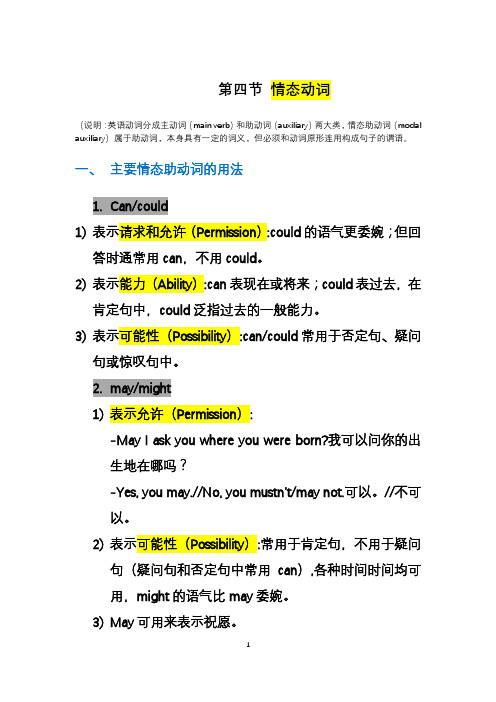
第四节情态动词(说明:英语动词分成主动词(main verb)和助动词(auxiliary)两大类,情态助动词(modal auxiliary)属于助动词,本身具有一定的词义,但必须和动词原形连用构成句子的谓语。
一、主要情态助动词的用法1.Can/could1)表示请求和允许(Permission):could的语气更委婉;但回答时通常用can,不用could。
2)表示能力(Ability):can表现在或将来;could表过去,在肯定句中,could泛指过去的一般能力。
3)表示可能性(Possibility):can/could常用于否定句、疑问句或惊叹句中。
2.may/might1)表示允许(Permission):-May I ask you where you were born?我可以问你的出生地在哪吗?-Yes, you may.//No, you mustn’t/may not.可以。
//不可以。
2)表示可能性(Possibility):常用于肯定句,不用于疑问句(疑问句和否定句中常用can),各种时间时间均可用,might的语气比may委婉。
3)May可用来表示祝愿。
3.will/would1)用于第二人称疑问句中,表示请求、建议。
Would或w on’t的语气较will更委婉,不表时态。
2)表示意愿(Willingness)、意图(intention)、决心(determination)、承诺(promise)、预测等。
可用于各种人称。
4.Shall1)Shall用于第一、三人称疑问句中,表示征求对方的意见或向对方请示。
2)Shall用于第二、三人称的肯定句,表示命令、警告、威胁、强制、允诺等。
5.Should1)Should表示劝告、建议时,可译为“应该“,与ought to通用;但表示道义上的责任、义务时只能用ought to。
2)Should 表推测、可能时,往往有一定的根据,含有“按道理应该”之意。
英语专业四级语法复习考点

4. the more…the more…与 more and more
the more...the more…表示两个过程中同时递 增,是主从结构。more and more 只表示一个 过程的不断增长。如 …the wilder the range of our life and the more various the contacts we have, the wilder and suppler must be our command over a rang of English styles.
3. If your car should need any attention during the first 12 months, take it to an authorized dealer. (98年)
(2)区分主从句表示的不同时间概念: 主从句谓语动词所指时间不同,这叫做错 综时间条件句,动词形式应根据实际情况 来调整。如: Had it not been for the timely investment from the general public, our company would not be so thriving as it is. (主句与现在事实相反,从句与过去事实 相反)
3.(the)+adj/adv最高级+比较范围
比较级形式表示最高级意义时,比较对象的 范围应用: any other +单数名词 the other +复数名词 the others anyone/anything else 上述词是用来将比较级结构转变成最高级意 义的关键词语,切不可遗漏,否则会造成逻 辑混乱的错误 。
(3)识别事实和假设混合句: Your maths instructor would have been happy to give you a make-up examination had you gone and explained that your parents were ill at the time. (句子前半部分为假设情况,而“父母 病了”是事实)
英语专业四级语法全面总结

Can, may, must, could, might, should, need, dare, ought to
can 表能力,表请求,表对现在事实的肯定猜测. Eg. The light is on, so she can be at home. could 与 was able to I _________ speak English when I was five years old.
反意疑问句 She would have been more agreeable if she had changed a little bit, ________? A. hadn’t she B. hasn’t she C. wouldn’t she D. didn’t she
2. 在I suppose, / think/ believe/ expect 构成的句中, 反意问句根据后半部分而 定. I don’t think he will come, will he? 3. 如果主句中带有seldom, hardly, never, rarely, little, nowhere 等否定词时, 疑 问部分的谓语动词要用肯定式.
No such + n. (不带冠词)+ as 没有….如
There is no such thing as private ownership of land. 土地从未归 于私人所有.
Not so much….as ….
as such 照此, 就以这种身份(资格) A name, as such, means nothing. So much so that 到这种程度…以至于 He likes them So much so that he eats them almost every day.
情态动词总结知识点
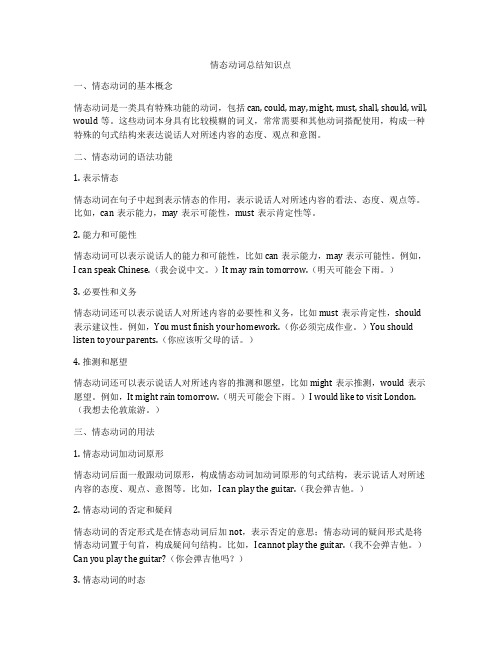
情态动词总结知识点一、情态动词的基本概念情态动词是一类具有特殊功能的动词,包括can, could, may, might, must, shall, should, will, would等。
这些动词本身具有比较模糊的词义,常常需要和其他动词搭配使用,构成一种特殊的句式结构来表达说话人对所述内容的态度、观点和意图。
二、情态动词的语法功能1. 表示情态情态动词在句子中起到表示情态的作用,表示说话人对所述内容的看法、态度、观点等。
比如,can表示能力,may表示可能性,must表示肯定性等。
2. 能力和可能性情态动词可以表示说话人的能力和可能性,比如can表示能力,may表示可能性。
例如,I can speak Chinese.(我会说中文。
)It may rain tomorrow.(明天可能会下雨。
)3. 必要性和义务情态动词还可以表示说话人对所述内容的必要性和义务,比如must表示肯定性,should 表示建议性。
例如,You must finish your homework.(你必须完成作业。
)You should listen to your parents.(你应该听父母的话。
)4. 推测和愿望情态动词还可以表示说话人对所述内容的推测和愿望,比如might表示推测,would表示愿望。
例如,It might rain tomorrow.(明天可能会下雨。
)I would like to visit London.(我想去伦敦旅游。
)三、情态动词的用法1. 情态动词加动词原形情态动词后面一般跟动词原形,构成情态动词加动词原形的句式结构,表示说话人对所述内容的态度、观点、意图等。
比如,I can play the guitar.(我会弹吉他。
)2. 情态动词的否定和疑问情态动词的否定形式是在情态动词后加not,表示否定的意思;情态动词的疑问形式是将情态动词置于句首,构成疑问句结构。
比如,I cannot play the guitar.(我不会弹吉他。
情态动词全部知识点总结
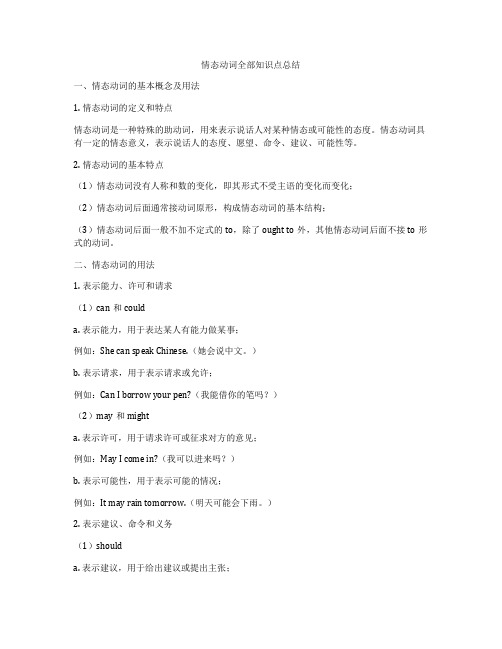
情态动词全部知识点总结一、情态动词的基本概念及用法1. 情态动词的定义和特点情态动词是一种特殊的助动词,用来表示说话人对某种情态或可能性的态度。
情态动词具有一定的情态意义,表示说话人的态度、愿望、命令、建议、可能性等。
2. 情态动词的基本特点(1)情态动词没有人称和数的变化,即其形式不受主语的变化而变化;(2)情态动词后面通常接动词原形,构成情态动词的基本结构;(3)情态动词后面一般不加不定式的to,除了ought to外,其他情态动词后面不接to形式的动词。
二、情态动词的用法1. 表示能力、许可和请求(1)can和coulda. 表示能力,用于表达某人有能力做某事;例如:She can speak Chinese.(她会说中文。
)b. 表示请求,用于表示请求或允许;例如:Can I borrow your pen?(我能借你的笔吗?)(2)may和mighta. 表示许可,用于请求许可或征求对方的意见;例如:May I come in?(我可以进来吗?)b. 表示可能性,用于表示可能的情况;例如:It may rain tomorrow.(明天可能会下雨。
)2. 表示建议、命令和义务(1)shoulda. 表示建议,用于给出建议或提出主张;例如:You should see a doctor.(你应该去看医生。
)b. 表示义务,用于表示责任或义务;例如:We should obey the law.(我们应该遵守法律。
)(2)ought toa. 表示责任或义务,用于表示应该做的事情;例如:You ought to apologize to her.(你应该向她道歉。
)3. 表示可能性和必然性(1)musta. 表示必然性,用于表示肯定的推断或必然的结论;例如:He must be at home now.(他现在一定在家。
)b. 表示义务,用于表示应遵守的规定或责任;例如:Students must wear school uniforms.(学生必须穿校服。
专四语法 情态动词

3.几个情态动词常考的句型 (1) may/might (just) as well“不妨,最好”, 与had better相近。如: Since the flight was cancelled, you might as well go by train. (2) cannot/can’t…too… “越……越好,怎么 也不过分”。
D. cannot +动词+形容词或副词+ enough 在“ cannot……too…… ”结构中的 too 可换成 enough , sufficient 或 sufficiently ; not 也可换成 never , hardly , scarcely 等否 定词。例如: You can never be strong enough. 强壮的身体有百利而无一害。 Drinking water can never be pure enough. 饮用 水越纯越好。
8. I went there in 1984, and that was the only occasion when I _____ the journey in exactly two days. (05, 57) A. must take B. must have made C. was able to make D. could make [C] 9. Since the weather is fine we _____ walk for a while. (03, 63) A. may B. must C. might as well D. will [C]
3. Which of the following sentences expresses “probability”? (08, 65) A. You must leave immediately. B. You must be feeling rather tired. C. You must be here by eight o’clock. D. You must complete the reading assignment on time. [B]
英语专业四级词汇语法辅导--情态动词

• 3. Which of the following sentences expresses B "probability"?2008 • A. You must leave immediately. • B. You must be feeling rather tired. • C. You must be here by eight o'clock. • D. You must complete the reading assignment on time. A • 4. He _____ the 8:20 bus because he didn’t leave home till 8:25. (1994) • A. can not /couldn’t have caught • B. ought to have caught • C. shouldn’t have caught • D. must not have caught
情态动词 Modal verbs
• 情态动词: • will(愿意), shall(将), must(必须), can, may, would, should (应该), might, could, ought to, used to (过去常常), need(需要), dare(竟敢),have to (不得不)
• (4) ought to / should have v-ed 和 ought not to / shouldn’t have v-ed • 用于对已发生的情况表示“责备”、“不满”,分别表示 “本应该…”和“本不应该…”表示应完成而未完成的动 作用于完成时中的否定句,表示不应完成但已做的动作 A• 1. Aren't you tired? I _____ you had done enough for today. (2009) • A. should have thought B. must have thought • C. might have thought D. could have thought
情态动词英语语法知识点

情态动词英语语法知识点情态动词,本身有一定的词义,表示语气的单词。
但是不能独立作谓语,只能和动词原形一起构成谓语。
这次小编给大家整理了情态动词英语语法知识点,供大家阅读参考。
1 情态动词的语法特征1) 情态动词不能表示正在发生或已经发生的事情,只表示期待或估计某事的发生。
2) 情态动词除 ought 和 have 外,后面只能接不带 to 的不定式。
3) 情态动词没有人称,数的变化,即情态动词第三人称单数不加-s。
4) 情态动词没有非谓语形式,即没有不定式,分词,等形式。
1 情态动词的语法特征1) 情态动词不能表示正在发生或已经发生的事情,只表示期待或估计某事的发生。
2) 情态动词除 ought 和 have 外,后面只能接不带 to 的不定式。
3) 情态动词没有人称,数的变化,即情态动词第三人称单数不加-s。
4) 情态动词没有非谓语形式,即没有不定式,分词,等形式。
2 比较 can 和 be able to1)can could 表示能力;可能 (过去时用 could),只用于现在式和过去式(could)。
be able to 可以用于各种时态。
They will be able to tell you the news soon. 他很快就能告诉你消息了。
2)只用 be able toa. 位于助动词后。
b. 情态动词后。
c. 表示过去某时刻动作时。
d. 用于句首表示条件。
e. 表示成功地做了某事时,只能用 was/were able to,不能用 could。
He was able to flee Europe before the war broke out. = He managed to flee Europe before the war broke out.注意:could 不表示时态1)提出委婉的请求, (注意在回答中不可用 could)。
--- Could I have the television on?--- Yes, you can. / No, you can't.2)在否定,疑问句中表示推测或怀疑。
英语专业四级语法专题(情态动词)ppt课件

情态动词 (+动词原形)
行为动词
1.无人称和数的变化; need 2.尤其用于:
*否定句及疑问句中;
*在if/whether之后; *或与hardly, never,
多用于肯定句;
(sb.) need to do
dare to do
.
(sth.) need to be
dare
no one, nobody连用;
A. provide
B. have provided
C. not provide D. not have provided 4
III. “may / might / must + 不定式完成式” 表示对过去事物的怀疑和推测(可用
于肯定句) She ____ fifty or so when I first met her
2
表示推测——情态动词的重要用法.情态动词对来对现在对过去
肯定的推测
~+V
~+V
~ + have done/
must/should常见must be must be doing have been doing
可能的推测
may, might
否定的推测
can’t, couldn’t
疑问的推测
can, could
劝告或命令 Must I hand it next week? No, you_____ ?
A. mustn't B. can't C. won't D. needn’t
7
V. could V.S. was/ were able to
was/ were able to表示过去有能力并且 成功地做了某事; could表示过去一般的 能力, 但不表示做或未做某事.
(完整版)情态动词归纳大学专四语法

(完整版)情态动词归纳大学专四语法情态动词有can (could), may (might), must, have to, shall (should, will (would), dare (dared), need (needed), ought to等。
情态动词无人称和数的变化;不能单独使用,必须与其后的动词原形构成谓语。
一、can, could1) 表示能力(体力、知识、技能)。
Can you lift this heavy box?(体力)Mary can speak three languages.(知识)Can you skate?(技能)此时可用be able to代替。
Can只有一般现在时和一般过去式;而be able to则有更多的时态。
I’ll not be able to come this afternoon.2) 表示请求和允许。
-----Can I go now?----- Yes, you can. / No, you can’t.此时可与may互换。
在疑问句中还可用could,might代替,不是过去式,只是语气更委婉,不能用于肯定句和答语中。
----Could I come to see you tomorrow?---- Yes, you can. ( No, I’m afraid not. )3) 表示客观可能性(客观原因形成的能力)。
They’ve changed the timetable, so we can go by bus instead.This hall can hold 500 people at least.4) 表示推测(惊讶、怀疑、不相信的态度),用于疑问句、否定句和感叹句中。
Can this be true?This can’t be done by him.How can this be true?二、may, might1) 表示请求和允许。
英语专业四级词汇语法辅导时态代词情态动词形容词副词句子成分
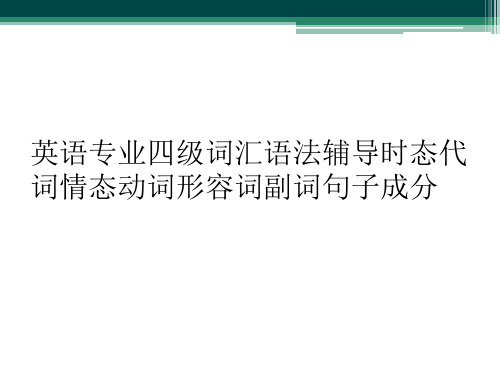
• 2.Mr. Wells, together with all the members of his family, ____ for Europe this afternoon.(2004—51)
一般现在时
• 考点三:在make sure (certain), see to it, mind, care, matter +宾语从句, 从句用一般现在时代 替一般将来时。
For example: • So long as he works hard, I don’t mind when he
finishes the experiment. • 只要他努力工作, 我不介意他什么时候做完试验
一般现在时
• 考点一:表示永恒的真理,即使出现在过去的语境中,
仍用一般现在时。
• I learned that the earth goes around the sun when I was in primary school.
•
考点二:在时间和条件状语从句中,代替一般将来时;
常用的引导词有:
•
•
I have learned English for ten years.
现在完成时
• 考 点 二 : 常 见 的 不 确 定 的 时 间 状 语 : lately; recently, just, already, yet, up to now; till now; so far, these days, for
英语专业四级词汇语法辅导时态代 词情态动词形容词副词句子成分
1、一般现在时
主要用来表示人、事物的现在状况和特点; 表示经常或习惯性的动作,句子中常有 often, always, from time to time 等时间状 语; 表示客观规律和永恒真理等。 • He usually goes to work at 7 o’clock every morning. • She has a brother who lives in New York. • The earth goes around the sun. • Guangzhou is situated in the south of China.
专四语法7讲--倒装句及情态动词

• 该强调句型不能用来强调谓语动词和部分 状语从句,如让步状语从句和表示对比的 从句。 • Though he is poor, he is very honest. • We are science students whereas they are students of liberal arts.
倒装句
分类:全部倒装、部分倒装
• 全部倒装:指将谓语动词全部提到主语 前面。 部分倒装:指仅把助动词、情态动词或 谓语动词的一部分置于主语之前。
•
具体情况
•
•
1. 修饰谓语动词或句子的含否定意义的词或词 组须置于句首,句子用部分倒装。 no, not ,never, seldom, little, nor, neither, nowhere, not until, hardly/scarcely/rarely, hardly/scarcely… when.., no sooner… than…, in vain, at no time, by no means, on no account, under/in no circumstances, in no way, in no case, not only.. but (also)…
• Only by actively involving yourself in social practice can you accumulate enough working experience. 只有积极投身于社会实践,方能积 累丰富的工作经验。 So challenging was the task that it took us much time to finish it. 这项任务有相当难度,我 们费了很多时间才完成。 Such was the force of the explosion that all the windows were broken. 爆炸力如此之大,窗户 玻璃都震碎了。
完整版专四英语语法考点

语法考点之一:虚拟语气考点1. If从句中的虚拟语气1、与过去事实相反:从句sb had done,主句sb would(should,could,might)+ have done;1. I ___the party much more if there hadn’t been quite such a crowd of people there. 1996A. would enjoyB. will have enjoyedC. would have enjoyedD. will be enjoying2. All of us would have enjoyed the party much more if there ___ quite such a crowd of people there.2000A. weren’tB. hasn’t beenC. hadn’t beenD. wouldn’t省略if,从句的语序用到装,即将were,had或should移至主语的前面,但否定词not不前移。
3. Had Judy been more careful on the maths exam, she ____ much better results now. 2008A. would be gettingB. could have gotC. must getD. would get4. ______you were busy, I wouldn’t have bothered you with my questions. 1994A. If I realizedB. Had I realizedC. I realized thatD. As I realized5.___, he would not have recovered so quickly. 1995A. Hadn't he been taken good care ofB. Had he not been taken good care ofC. Had not he been taken good care ofD. Had he been not taken good care of6. ___for the fact that she broke her leg, she might have passed the exam. 2002A. Had it not beenB. Hadn’t it beenC. Was it notD. Were it not2、与现在事实相反:从句sb did(were),主句sb would(should, could, might)+do;1. If there were no subjunctive mood, English _____ much easier to learn.2009A. could have beenB. would beC. will beD. would have been2. If you explained the situation to your solicitor, he ________ able to advise you much better than I can.2005A. would beB. will have beenC. wasD. Were3、与将来事实相反:从句sb did (should+do或were+to do),主句sb would (should, could, might)+do。
专四考前英语语法考点归纳

英语语法考点归纳情态动词的用法1. may , might 或许,可能,可以(might可以看作是may的过去式,这两个词除了时态不相同外,在表达意思的许多方面是相近的。
当然may 和might又都有一些各自不同的独特用法。
)might常用于表示目的等状语从句中,或用于虚拟语气的结构中:I could not convince him , try as I might .我无论用什么样的办法也不能说服他。
They left off earlier on that day so that they might catch the first train .那天,他们为了赶上头班车动身早一些。
He died so that the others might live .为了其他的人能活下去,他自己牺牲了。
注意:在回答以may引导的问句时,一般说来避免使用may,以免显得太严厉、或不太客气,而改用其他方式。
例如:--May I come in ? --Yes , please .请进。
我可以进来吗?-Sure . / Certainly .请进。
--Please don't . .请不要进来。
--No , you mustn't .不行。
2. must 应该,必须,一定1) 表示出于职责、义务该做某事We must protect people's rights .我们应该保护人民的利益。
Everyone must be loyal to his motherland .每个人都应该忠于自己的祖国。
2)表示出于主观意识而必须要做某事We must speed up the pace of our economic reform .我们必须加速经济改革的步伐。
We must keep steps to the scientific development .我们一定要与科学的发展保持一致步调。
专四英语语法考点分析解析

语法考点之一:虚拟语气考点1. If从句中的虚拟语气1、与过去事实相反:从句sb had done,主句sb would(should, could, might)+ have done;2、省略if,从句的语序用到装,即将were, had或should移至主语的前面,但否定词not不前移。
3、与将来事实相反:从句sb did (should+do或were+to do),主句sb would (should, could, might)+do。
4、错综条件句:主句与从句的动作发生在不同的时间段。
比如:从句对过去虚拟,而主句对现在虚拟,即从句sb had done,主句sb would(should, could, might)+do;考点2:表示建议、要求、命令等动词如insist, order, command, suggest, advise, propose, ask, require, request, demand引导的从句和it引导的相应的分词、名词和形容词从句,谓语用(should)+动词原形。
考点3:It is +advisable, essential, important, imperative, incredible等从句,谓语用(should)+动词原形。
考点4:it is (high/about) time that的结构中,从句使用一般过去式。
例如:考点5:much as"尽管,虽然"引导让步状语从句,从句中用would have done表示假设。
考点6:if only, wish, as if/as though引导从句,与过去事实相反:had + done;与现在事实相反:动词过去式;与将来事实相反:could/would + do考点7:would rather/sooner从句中使用一般过去式或过去完成式分别表示对现在或过去的虚拟考点8:lest / for fear that+(should ) +原形动词。
英语专业四级语法汇总

语法回顾篇专四语法考点虚拟语气、情态动词、非谓语动词、复合句、倒装、小语法(省略,时态,反义疑问句,代词,强调句,主谓一致,冠词,形容词及副词)、as 的特殊用法。
专四英语语法考点串讲之一虚拟语气一般说来,有下列几种考点需要考生注意(十考点及两备考点)考点1. 与现在事实相反从句谓语动词用did(be用were),主句谓语动词would(should,could,might)+do;考点2. 与过去事实相反从句谓语动词用had done,主句谓语动词用would(should,could,might)+ have done;例如:43.I _________the party much more if there hadn‟t been quite such a crowd of people there.A. would enjoyB. will have enjoyedC. would have enjoyedD. will be enjoying49.All of us would have enjoyed the party much more if there _________ quite such a crowd of people there.A. weren‟tB. hasn‟t beenC. hadn‟t beenD. wouldn‟t考点3.与将来事实相反,从句谓语动词用:did(should+do或were + to do),主句谓语动词用:would(should,could,might)+do。
例如:43. If your car ___ any attention during the first 12 months, take it to an authorized dealer.(08年)• A. shall need C. would need• B. should need D. will need考点4. 时态的交叉现象,也就是主句与从句的动作发生在不同的时间段例如:If you had gone to see the doctor,you would be all right now.你要是早去看病,你现在就没事了。
(完整版)情态动词知识点总结

(完整版)情态动词知识点总结什么是情态动词情态动词(Modal verb)是一种特殊的动词形式,用来表示说话人对某种行为、情况或可能性的态度、观点、意愿、能力等。
情态动词可以用来构成陈述句、疑问句、否定句、建议句等。
常用的情态动词及其用法1. Can:表示能力、许可、可能性、请求等。
Can:表示能力、许可、可能性、请求等。
- 表示能力:I can swim.(我会游泳。
)- 表示许可:Can I use your phone?(我可以用一下你的手机吗?)- 表示可能性:He can be late.(他可能会迟到。
)- 表示请求:Can you help me?(你能帮我吗?)2. Could:表示过去的能力、请求、建议等。
Could:表示过去的能力、请求、建议等。
- 表示过去的能力:When I was young, I could run faster.(我年轻的时候,跑得更快。
)- 表示请求:Could you please pass me the salt?(你能给我递一下盐吗?)- 表示建议:You could try using a different approach.(你可以尝试用一种不同的方法。
)3. May:表示可能性、许可、祝愿等。
May:表示可能性、许可、祝愿等。
- 表示可能性:It may rain tomorrow.(明天可能会下雨。
)- 表示许可:May I use your bathroom?(我可以使用你的卫生间吗?)- 表示祝愿:May you have a happy birthday!(祝你生日快乐!)4. Might:表示可能性、建议、推测等。
Might:表示可能性、建议、推测等。
- 表示可能性:She might be at home.(她可能在家。
)- 表示建议:You might want to consider another option.(你可以考虑另一个选项。
- 1、下载文档前请自行甄别文档内容的完整性,平台不提供额外的编辑、内容补充、找答案等附加服务。
- 2、"仅部分预览"的文档,不可在线预览部分如存在完整性等问题,可反馈申请退款(可完整预览的文档不适用该条件!)。
- 3、如文档侵犯您的权益,请联系客服反馈,我们会尽快为您处理(人工客服工作时间:9:00-18:30)。
专四英语情态动词语法考点
2018年专四英语情态动词语法考点
考试中,情态动词部分重点测试以下内容:
(1)情态动词+行为动词完成式
(2)某些情态动词的特殊用法
1.musthavev-ed
musthavev-ed表示推测过去某事“一定”发生了。
其否定形式为:can’t/couldn’thavev-ed,表示过去不可能发生某事。
例如:
Sincetheditchisfullofwater,itmusthaverainedlastnight.
2.couldhavev-ed表示推测过去某动作“很可能”发生了
3.may/mighthavev-ed表示推测过去某事“也许”发生了.may比might表示的可能性在说话人看来稍大些。
4.oughtto/shouldhavev-ed和oughtnotto/shouldn’thavev-ed 用于对已发生的情况表示“责备”、“不满”,分别表示“本应该…”和“本不应该…”表示应完成而未完成的动作用于完成时中的否定句,表示不应完成但已做的动作
5.needn’thavev-ed表示过去做了某事,但没有做的必要,意为“本没必要…”。
例如:
Youneedn’thavewakenmeup;Idon’thavetogotoworktoday.
注意:didnotneedtodo动作并没发生
例:Ididn’tneedtogetupearly,soIgotupuntil9a.m.
*特殊用法
(1)can‘t表示“不可能”,maynot表示“不可以”,mustn’t(mustnot)表示“不许可禁止”,needn't(neednot)表示“不必”,darenot+动词原形表示“不敢”
(2)must表推测的否定现在式用c an’t,过去式用couldn’t
(3)MayI/we…?这一类疑问句的肯定回答为Yes,please.或Certainly;否定回答为Pleasedon’t.或No,youmustn’t.例如:
“Mayweleavenow?”“No,youmustn’t.Youhaven’tfinishedyo urhomeworkyet.”
(4)needI/we…?这一类疑问句的肯定回答为Yes,wemust;否定回答为needn’t
(5)在回答must引起的问题时,如果是否定的答复,不能用mustn’t,而要用needn’t或don’thaveto
(6)May/mightaswellmay……but….(表转折)
(7)Iwishtogohomewithyou,mayI?
(8)Dohelpyourselftohavefruit,won’tyou/willyou?(表示一种委婉的请求)
*情态动词短语的使用
wouldliketodo…
wouldratherdo…
wouldrather+从句
wouldprefertodo...
hadbetterdo...
*情态动词:will(愿意),shall(将),must(必
须),can,may,would,should(应
该),might,could,oughtto,usedto(过去常常),need(需要),dare(竟敢),haveto(不得不)
*dare,need也可作一般(行为)动词
*情态动词一般用法的否定:
mustn’t不准,禁止,不要can’t(couldn’t)不会;不能;
may(might)not不可以;
needn’t没必要(=don’thaveto)
usednot/usedn’tto或didn’tuseto…过去不…
darenot不敢
*情态动词推测用法
Must一定,肯定can’t(couldn’t)不可能
Can/could可能Can’t(couldn’t)不可能
may/might“可能,也许”May(might)not也许不,可能不
*推断用法
should/oughtto“按理应当,应该是;shouldn’t不应该
(=oughtnotto)
*情态动词+have+done结构表示对过去动作的`推测
1.musthavedone:对过去的肯定推测,译作“一定做了…”,只能用于肯定句中。
其否定形式为can’t/couldn’thavedone?
Itmusthaverainedlastnight,fortheroadwasquitemuddy
2.can/couldhavedone:对过去的可能性推测,译作“可能做了…”。
只能用疑问句中
Can/Couldhehavesaidit?他可能说过那种话吗?
3.may/mighthavev-ed:对过去的可能性推测,译作“也许能,有可能。
It’stoolate.Ithinkhemayhavegon etobed.
*情态动词+have+过去分词结构表示轻微的责备和后悔
肯定:过去应该做而没有做;
否定:过去不该(不必)做而做了。
⑴might/could+have+过去分词:“本来可以,早就应该”
(只用于肯定句,且不能用may,can)
Youcouldhavetoldmeyouweregoingtobelate!.你应当早告诉我你会晚到的!
⑵should(oughtto)+have+过去分词:“本应”(没做)
shouldnot(oughtnotto)+have+过去分词:“本不该”(做了)
Youshouldnothavehandedinyourcompositionyesterdaymorning.你本不应把作文交了。
Youshouldhavebeenhereearlier.你应该早点来才对。
3.needn't+have+过去分词:“本不必,本不须”(need只用于否定句)(做了)
Youneedn'thavewokenherup.It'sonlysix.你其实不必叫醒她。
现在才六点。
注意:didnotneedtodo动作并没发生(没做)
例:Ididn’tneedtogetupear ly,soIgotupuntil9a.m.
*八大注意点
1.在以could,might表示征询对方意见或表示请求时,回答应相应使用can,may
—MightIwatchTVaftersupper?—Yes,you________.
A.may
B.must
C.might
D.can
2.MayI/we…?这一类疑问句的肯定回答为Yes,please.或Certainly;否定回答为Pleasedon’t.或No,youmustn’t.例如:
“Mayweleavenow?”“No,youmustn’t.Youhaven’tfinishedyo urhomeworkyet.”
3.needI/we…?这一类疑问句的肯定回答为Yes,wemust;否定回
答为needn’t
4.在回答must引起的问题时,肯定must;如果是否定的答复,
不能用mustn’t,而要用needn’t或don’thaveto
5.Iwishtogohomewithyou,mayI?
6.Dohelpyourselftohavefruit,won’tyou/willyou?(表示一种
委婉的请求)
7.Shall用于第三人称,表示许可,允许
8.let’sdothisjob,shallwe?Letusdothisjob,willyou?
9.should也表示惊讶的语气,
例如:Iwasshockedthatsheshouldhavesaidsuchathingtoyou.(她竟然对你
说那样的话,…)
*四大特殊结构
1.may/mightaswell+动词原形”意为“最好,满可以,倒不如”,相当于hadbetter
Youmayaswelldoitatonce.
2.maywell+动词原形”是一种常见的结构,意为“(完全)能,很可能”
Hemaywellbeproudofhisson.
他大可为儿子高兴。
3.cannot…too/enough表示“无论怎么……也不算过分”、“越……越好”
Youcannotbetoocareful.
4.hadbetter最好
Youhadbetternotwakemeupwhenyoucomein.
*两大类区别:
一、表示能力:can,beableto
beableto能用于各种时态。
can/could只能表示现在或过去的能力
*was/wereableto:“设法做成某事”
相当于managedtodosthsucceededindoingsth.
二、usedto和would的区别
usedto过去常常(但现在已无此习惯,would无此含义)
Heusedtodrinkbeer,nowhedrinkswine.他过去喝啤酒,现在喝白酒。
would只能用来谈动作;usedto用来谈动作或状态(可与
be,live,like,stay等状态动词连用):
Hewouldgetupearlywhenhelivedinthecountry.他住在乡下时总是早起。
Weusedtoliveinasmalltown.(不能用would) Beusedtodoingsth:习惯于做某事。
